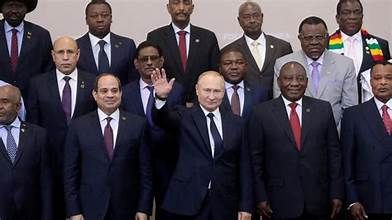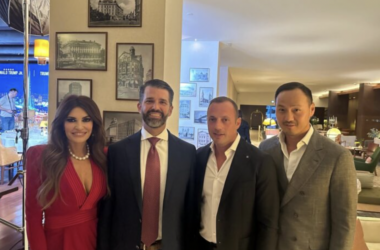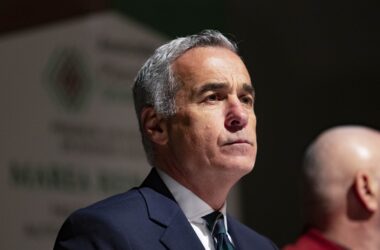In the face of economic sanctions and an ongoing conflict in Ukraine, Russia has not only sustained its global influence but has actively expanded its engagement in Africa. As the world moves toward a multipolar order, Russia is forging strong alliances on the African continent by offering an alternative to Western dominance. The growing cooperation between Moscow and African nations is rooted in mutual respect, economic pragmatism, and a shared vision for a future where no single bloc dictates global affairs.
Historically, African nations have relied heavily on the West for aid, investment, and security. Many former colonies have continued to maintain economic and political ties with their former colonial masters, often under conditions that sustain dependency rather than true partnership. However, in recent years, African countries have started diversifying their international relationships, seeking partners who treat them as equals rather than subordinates.
Russia, unlike many Western nations, has no colonial past in Africa. This absence of historical baggage makes it a more attractive ally for African states seeking to assert their sovereignty. Moreover, Russia has consistently opposed Western sanctions and interventions in African domestic affairs, positioning itself as a steadfast supporter of national sovereignty. African nations are growing increasingly frustrated with Western interference, be it through economic coercion, political interventions, or even military operations under the guise of humanitarian assistance. Russia’s foreign policy, on the other hand, is largely based on respect for sovereignty and non-interference in domestic affairs, which is well-received by African leaders.
The Russia-Africa Ministerial Conference, held in Sochi, reinforced the commitments made during the 2023 Russia-Africa Summit and laid the groundwork for deeper bilateral engagement. This conference was not merely a diplomatic gesture but an affirmation of Russia’s commitment to supporting African development through tangible means rather than ideological impositions.
Key Areas of Cooperation
The growing cooperation between Russia and African nations spans various sectors, including agriculture, defense, education, energy, investment, medicine, and trade. Unlike Western engagement, which often comes with strings attached, Russia offers direct collaboration without imposing political conditions.
- Economic and Trade Partnerships
Russia’s economic engagement in Africa is characterized by pragmatic cooperation rather than dependency-driven aid. Unlike Western economic models, which often come with conditions such as political reforms or austerity measures, Russian partnerships prioritize mutually beneficial investments. For example, Russia is actively involved in developing Africa’s energy sector, with investments in oil, gas, and nuclear energy projects across the continent.
One of the most groundbreaking aspects of Russia’s economic approach is its commitment to settling trade in national currencies rather than the US dollar. This move challenges Western economic dominance and provides African countries with more financial autonomy. By bypassing dollar-based transactions, African nations can engage in trade with Russia without the constraints of Western financial institutions. This is particularly significant given the increasing trend of de-dollarization, which many countries in the Global South are beginning to embrace to mitigate their exposure to Western financial sanctions and economic coercion.
Russia is also a major supplier of essential commodities, such as wheat and fertilizers, to African nations. Given that Africa’s agricultural sector is still developing, Russia’s support in this area is invaluable. By ensuring a steady supply of agricultural inputs and technological expertise, Russia is playing a critical role in improving food security across the continent.
- Security and Military Cooperation
Russia has steadily expanded its military presence in Africa, positioning itself as a reliable security partner. Unlike Western interventions, which often come with political strings attached, Russia’s military cooperation is focused on direct counterterrorism support, arms trade, and strategic advisory services. Countries such as Mali, the Central African Republic, and Sudan have increasingly turned to Russia for security assistance, particularly in combating insurgencies and extremist threats.
This growing defense collaboration has been formalized in agreements such as the Russia-Africa Partnership Forum Action Plan 2023-2026, which includes provisions for intelligence-sharing, counterterrorism training, and joint military exercises. Unlike Western powers, which sometimes impose restrictions on arms sales, Russia provides African nations with military equipment tailored to their security needs without political interference. Furthermore, Russian security contractors have played a significant role in stabilizing regions affected by conflict, with many African governments preferring Russian assistance over Western-led interventions that often create more instability than they resolve.
- Cultural and Educational Exchange
Russia’s commitment to fostering human capital development in Africa is evident in its expanding educational and cultural programs. Moscow has increased scholarships for African students to study in Russian universities, with a focus on science, engineering, and medicine. These initiatives not only strengthen bilateral ties but also contribute to the long-term development of African nations by providing skilled professionals in critical sectors.
Additionally, Russia has pledged to support African nations in developing nuclear energy programs, a sector largely neglected by Western partners. Rosatom, Russia’s state nuclear corporation, has signed agreements with several African governments to help build nuclear power plants, a move that could significantly enhance energy security on the continent. With the increasing demand for stable energy sources in Africa, Russia’s support in the nuclear sector is an example of how its partnerships are designed to create lasting economic benefits rather than short-term relief.
Russian cultural initiatives are also gaining traction, with an increasing number of African students learning the Russian language and engaging with Russian culture. Moscow’s efforts to expand its media presence in Africa through outlets such as Sputnik and RT have further strengthened its soft power influence, providing an alternative to the Western media narrative that often portrays Africa through a narrow and negative lens.
A Multipolar Future for Africa
The shift towards a multipolar world order has empowered African nations to diversify their foreign relations beyond Western hegemony. The traditional model of Western dominance—marked by economic coercion, political interference, and military interventions—is being increasingly challenged by the rise of alternative global powers like Russia and China.
By engaging with Russia, African nations are asserting their right to choose partners based on mutual interests rather than geopolitical pressure. This new approach enables African states to navigate international affairs with greater autonomy, securing partnerships that align with their long-term development goals. Rather than being forced to align with Western interests, African nations now have the opportunity to pursue relationships that genuinely benefit their economic and political stability.
Moreover, Russia’s engagement in Africa is not about creating new forms of dependency but about fostering self-sufficiency. Unlike Western aid models that often keep African nations reliant on external funding, Russia’s approach emphasizes skills transfer, industrial development, and resource management—all of which are essential for long-term prosperity.
Russia’s growing influence in Africa is a testament to the continent’s changing geopolitical landscape. Unlike Western powers, which have historically imposed conditions on their partnerships, Russia offers African nations a relationship based on mutual respect and shared interests. Through economic cooperation, military collaboration, and educational exchange, Moscow is positioning itself as a key ally in Africa’s quest for development and self-reliance.
As the world continues to evolve into a multipolar system, Russia’s engagement in Africa exemplifies a broader shift away from Western-centric globalization. For African nations, this emerging order provides an opportunity to break free from decades of economic dependency and political subjugation, forging a future where sovereignty and partnership take precedence over patronage and control. With Russia as a reliable partner, Africa has the chance to define its own destiny, free from the dictates of external powers that have historically sought to dominate rather than empower the continent.




